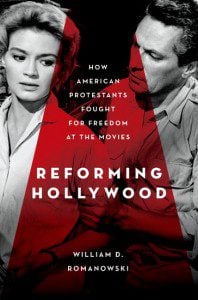Reforming Hollywood is a complex and fascinating book. “The prevailing view in histories of American film,” writes William Romanowski, “is that Protestants were determined to impose the rule of censorship on Hollywood, and for that reason they refused to cooperate with the [Motion Picture Producers and Distributors of America].” For a detailed and thorough review, see Alissa Wilkinson’s at Christianity Today.
In the contemporary United States, Christians — and many others — cannot escape or readily ignore aspects of popular culture that offend their sensibilities. Lee Siegel nicely captured this reality in a recent Wall Street Journal essay titled “America the Vulgar.” Siegel argues that in our culture has become so saturated with sex, profanity, and coarseness that we have taken away not only our innocence but our ability to be truly shocked and entertained by meaningful transgressions:
The fact is that you’re hearing the same language, witnessing the same violence, experiencing the same graphic sexual imagery on cable, or satellite radio, or the Internet, or even on good old boring network TV, where almost explicit sexual innuendo and nakedly explicit violence come fast and furious. Old and young, high and low, the idiom is the same. Everything goes … One can only hope that, as happens so often in America, restless impatience with the status quo will carry the day and the pendulum will swing to the other side—not toward censorship and repression but toward the sacred power of sexual self-assertion and outlaw imprecations.
Siegel’s conclusion would not resonate with many Christians, who see the sacred in things other than the “power of sexual-self-assertion and outlaw imprecations.” Still, his essay certainly captures the almost complete impotence of American Christianity in shaping a culture that reflects its values. Many evangelical leaders in recent decades have talked about “winning the culture.” Many mainline, liberal Protestants talked in similar terms in the early twentieth century. Evangelicals certainly lost.
Romanowski knows that most observers of the entertainment industry presume that Christians are puritanical, wanting nothing more than to censor sex and violence (well, really just sex) out of the movies. Certainly, the response of some Catholics and Protestants to The Last Temptation of Christ and the ill-fated and ineffective Disney boycott helped cement a reputation created by fundamentalist preachers who condemned all movie-going.
Instead, Romanowski convincingly argues that rather than seeking censorship, Protestant leaders associated with the Federal Council of Churches sought to avoid the necessity of censorship. Protestants often cooperated with the film industry’s efforts at self-regulation. Romanowski asks a smart question: “How is it that Protestants, by tradition defenders of American civil liberties, are seen primarily as ardent proponents of movie censorship?” In the minds of most non-Christian Americans, Protestant Christianity now equals evangelicalism or fundamentalism. Subtlety is lost. Thus, Romanowski concentrates primarily on the activities of the FCC and its successor, the National Council of Churches.
Romanowski also smartly frames his narrative as one of secularization, “not in the sense of a decline of religion, but rather the diminishing scope of religious authority.” There is no question that religious leaders exercised much greater authority in this realm one hundred years ago.
Despite his focus on the FCC/NCC, Romanowski intelligently questions the evangelical strategy of encouraging production studios to maximize their profits by targeting church audiences. By stressing the imperative of profits, that argument simultaneously legitimates the production of any film likely to generate profits, undercutting evangelical arguments about the corrosive effect of entertainment on youth. “I was struck,” he writes in his conclusion, “by the extent of the subjugation of traditional Protestant values — like service and love of neighbor, sustaining community, and concern for the public welfare — to the primacy of self-interest and the acquisition of wealth and power in American society.”
There is no easy solution for Christians hoping to reverse that tide. Fortunately, Romanowski doesn’t pretend to have simple prescriptions. What he does offer is a thoughtful analysis of the ways that Protestants have responded to Hollywood over the past hundred years.












